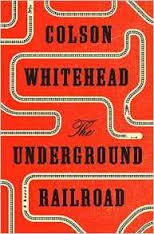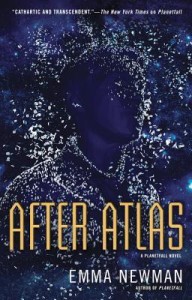Clarke Award Shortlist 2017 Part 2 : The Evil That Men Do
Underground Railroad – Colson Whitehead
After Atlas – Emma Newman (1)
So what about books that have a rather less optimistic take on the world? As it turns out, the shortlist has those too, and these are definitely the bleakest.
 I hadn’t come across Whitehead until the shortlist was announced, but a little research shows that’s entirely a deficit on my side, as he comes very highly recommended (1) over in the US, and Railroad shows why. This is a semi-historical, set in the pre-Civil War US and focusing on Cora, a third generation slave on a plantation who decides to make a break for the north. This is not a decision taken lightly. A fair chunk of the early book details the lives of Cora, her mother and her grandmother, and pulls absolutely zero punches when it comes to dealing with the obscene cruelty of slavery and the plantations, with details that, I have no doubt, are entirely based on real history. Whitehead has an elegant, easy style that carries the reader along effortlessly, which makes those moments when he slams you face-first into the next abomination all the more powerful. It is also a book about shades of horror, because Cora’s life starts off as grimmer than most grimdark fantasy could even imagine, and that’s a high point because her original owner is, at least, merely baseline disinterestedly cruel, rather than actively sadistic like the next man.
I hadn’t come across Whitehead until the shortlist was announced, but a little research shows that’s entirely a deficit on my side, as he comes very highly recommended (1) over in the US, and Railroad shows why. This is a semi-historical, set in the pre-Civil War US and focusing on Cora, a third generation slave on a plantation who decides to make a break for the north. This is not a decision taken lightly. A fair chunk of the early book details the lives of Cora, her mother and her grandmother, and pulls absolutely zero punches when it comes to dealing with the obscene cruelty of slavery and the plantations, with details that, I have no doubt, are entirely based on real history. Whitehead has an elegant, easy style that carries the reader along effortlessly, which makes those moments when he slams you face-first into the next abomination all the more powerful. It is also a book about shades of horror, because Cora’s life starts off as grimmer than most grimdark fantasy could even imagine, and that’s a high point because her original owner is, at least, merely baseline disinterestedly cruel, rather than actively sadistic like the next man.
Her story is interspersed with that of Ridgeway, a slave catcher, who is written as a kind of mirror-universe version of the traditional American/Western hero – he is a physically capable man who goes out and wrests a living from the world on his own terms, scornful of rules and civilized niceties – all very creditable except of course for what his living actually is. (And it is a nice touch that the Ridgeway we get in the sections where he is our POV is subtly more capable than the Ridgeway we see through Cora’s eyes when they clash).
Where this book crosses from the historical into Clarkes territory is the railroad of the title. Now I have a confession here, because my knowledge of this period is limited and my first introduction to the phrase ‘underground railroad’ was in Babylon 5, which utterly baffled me because I thought they were talking about a literal one. And in Whitehead’s book, there is. Instead of the loose network of sympathisers and rescuers, white and black, there is a genuine railroad under the ground smuggling slaves from place to place, constantly in danger of being discovered by the slavers. In this way, Whitehead gives us the southern US as a series of “stations” (2) where different scenarios play out between black and white, slave and free.
There is a large supporting cast on both sides of the divide, and Whitehead doesn’t just give us a polemic where all whites are evil, all slaves are virtuous – Cora’s early life in the plantation includes plenty of violence and ostracism from her fellows. The characters are all finely drawn, and there is a series of brief sketches giving us a window on some of the smaller roles. The book itself is a succession of tragedy and injustice, the whole world stacked against slaves on the run and whoever might lift a hand to help them, yet compelling all the while.
 I've praised Newman’s work on many occasions, and in particular I enjoyed Planetfall, to which After Atlas is a semi-sequel (like the Chambers, you can read Atlas alone but having read the first book will give you extra context).
I've praised Newman’s work on many occasions, and in particular I enjoyed Planetfall, to which After Atlas is a semi-sequel (like the Chambers, you can read Atlas alone but having read the first book will give you extra context).
Planetfall concerns itself with an extrasolar colony on a barren planet alongside an incomprehensible alien structure, guided there by a religious visionary. The colonists are, in effect, that part of her cult who got together the colossal resources required for humanity’s first jaunt to another star system in the spaceship ‘Atlas’. (because, like a lot of cults, they had many rich and influential members). After Atlas, as the title suggests, is about what they left behind, both the world as a whole and the remainder of the cult who didn’t get to go.
Carlos Moreno grew up in the cult, but subsequently broke from it and has a deeply ambivalent but mostly hostile attitude towards it. He got out by going into an intensive training/brainwashing program to turn him into a human super-investigator, which has further screwed him up as well as leaving him the property of the people who paid for his reprogramming (and I hadn’t considered the slavery link with Underground Railroad when I paired these books, but it’s there). His corporate owners hire him out to the police as a detective, and in his free time he scrounges for decent food he can’t afford (having an aversion to the printed food most everyone poor subsists on) and dodges the press who want to talk to him about his life in the cult (and his father, who remains a cultist). And then the head of the cult, who was a huge part of Carlos’ life back then, is found mysteriously dead in a UK countryside hotel and Carlos is the only investigator the vastly wealthy cult will trust.
It’s not uncommon to find SF or fantasy books that are also framed as crime/detective stories. There is, however, always a danger that, in trying to square that genre circle, the author delivers an uninteresting mystery in an uninteresting world. However, when done well, it’s a particular joy (as in Roberts’ Jack Glass say, or Christopher’s Made to Kill) and Newman does it particularly well. One of the big bugbears of a modern investigative novel, let alone a futuristic one, is the intrusion of technology – how can you have someone pottering about like Holmes or Poirot when all that hi-tech analysis is at their fingertips. In Atlas, that is the very point and heart of the investigation, as Carlos’ special flair is for data gathering and analysis, and he uses absolutely every avenue you’d expect to get to the truth (perhaps the lesson here is that a SF detective story needs to make the technology its vehicle, rather than an obstacle the writer must get around). Moreover, when we discover What Is Actually Going On, it’s both credible and poignant. And then, of course, we discover What Is Actually Actually Going On.
Just as Whitehead gives us an unvarnished view of a vile period of human history, Atlas gives us an unabashed dystopia – not the shooting arrows and rebellion against established order sort of dystopia, but a world that is decaying and running out of everything, where the imbalance between the vastly wealthy in their countryside retreats and the subsistence poor is a chasm grown so vast as to be insuperable. When we get to see the super-rich in all their vindictive glory, it made me genuinely furious. I raged for the main character and his helplessness in the face of such small-minded power (and that sketch of how plutocrat treats lesser beings who get in his way seems, these days, terribly well drawn). And what makes this world worse is the titular Atlas, because, rather than being the hopeful "reach for the stars", launching the first ship was a vast drain on global resources and talent, crippling the world economy, and of course everyone’s wondering if the cult – or someone else – will be launching another some time soon. Atlas is gritty, compelling and bleak as hell, and immeasurably plausible in its side-eye at human nature. The contrast to Tidhar and Chambers’ books is very marked. Here, launching a spaceship is not the jump to a new and bustling future but an act born equally of desperation and exploitation.
(1) Emma being a good friend I hereby solemnly swear that the book is bloody excellent without any favouritism coming into play. This becomes something of an occupational hazard after a while in the trade because you get to meet a fair proportion of your fellow authors.
(2) Including by a former president!
(3) In the same sense used by Coppola when talking about the journey in Apocalypse Now, and before that in the “of the Cross” sort of sense I think.
 © 2008-2024 Pan Macmillan
© 2008-2024 Pan Macmillan